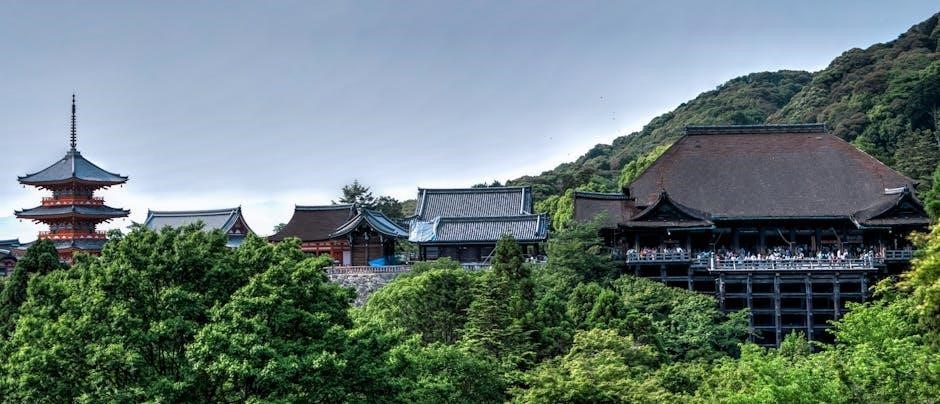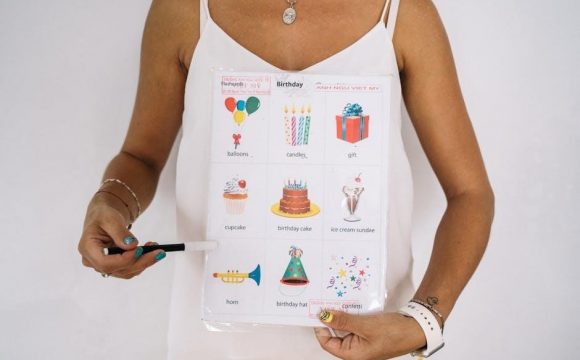Japanese travel phrases are essential for a smooth experience in Japan‚ helping you navigate transportation‚ dining‚ and cultural interactions. Downloadable PDF guides offer handy cheat sheets with key expressions for tourists‚ ensuring easy communication and enhancing your trip’s enjoyment.
Importance of Learning Japanese Phrases for Travelers
Learning Japanese travel phrases is crucial for a seamless and enjoyable experience in Japan. While many locals appreciate visitors’ efforts to communicate‚ English is not widely spoken‚ especially outside major cities. Knowing essential phrases enhances navigation‚ dining‚ and cultural interactions. Simple expressions like greetings and directions can significantly improve your trip. PDF guides and cheat sheets are excellent resources‚ offering practical vocabulary for situations like using trains‚ ordering food‚ and shopping. These tools help bridge the language gap‚ ensuring travelers can ask for help‚ understand signs‚ and connect with locals. Mastering even basic phrases demonstrates respect for the culture and can lead to more meaningful experiences during your stay in Japan.
Overview of Common Japanese Travel Phrases
Common Japanese travel phrases cover essential communication needs for visitors‚ from basic greetings to practical expressions for dining‚ shopping‚ and transportation. These phrases are designed to help travelers navigate everyday situations‚ ensuring smooth interactions. Key expressions include asking for directions‚ ordering food‚ and making purchases. Many resources‚ such as downloadable PDF guides‚ compile these phrases into easy-to-use cheat sheets. They often categorize phrases by situation‚ like train travel or restaurant interactions. These tools emphasize pronunciation guides and context-specific vocabulary. By mastering these phrases‚ travelers can confidently communicate‚ enhancing their overall experience in Japan. Whether you’re lost in a bustling city or enjoying a quiet village‚ these expressions provide a foundation for effective communication and cultural connection.
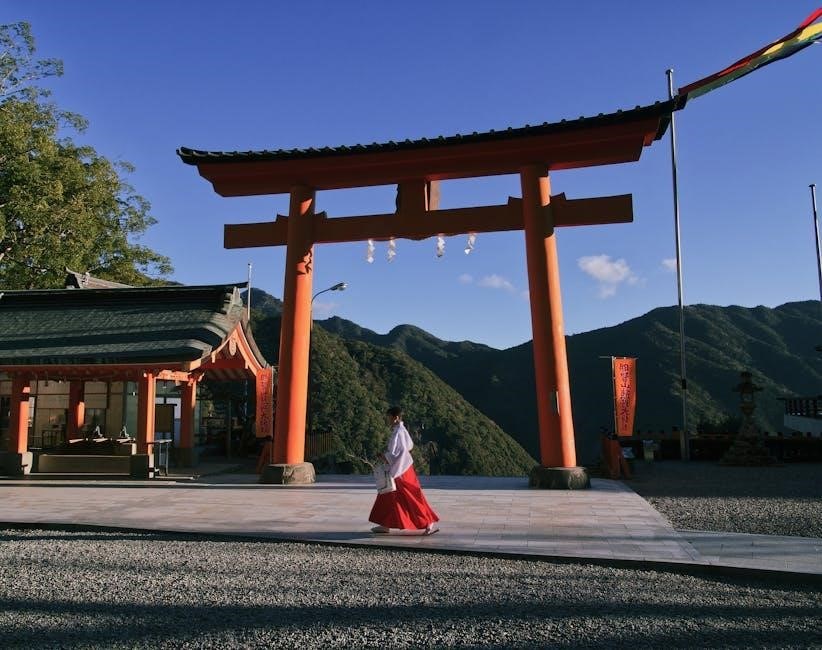
Essential Japanese Phrases for Everyday Situations
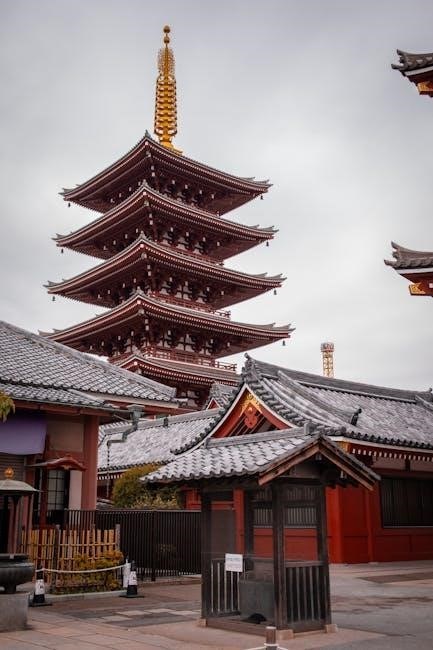
Essential Japanese phrases for everyday situations include basic greetings and expressions that help travelers navigate common scenarios‚ ensuring smooth communication and enhancing their experience in Japan.
Greetings and Basic Expressions

Mastering basic Japanese greetings and expressions is crucial for any traveler. Common phrases like “Ohayou gozaimasu” (good morning)‚ “Konnichiwa” (hello)‚ and “Konbanwa” (good evening) are essential for daily interactions. “Arigatou” (thank you) and “Sumimasen” (excuse me/sorry) are polite expressions that show respect and appreciation. Learning these phrases helps travelers connect with locals and navigate everyday situations smoothly. Many PDF guides include pronunciation guides and context for proper usage‚ ensuring visitors can communicate effectively. These expressions are foundational for a respectful and enjoyable experience in Japan.
Asking for Directions and Help
Asking for directions and help is a common need for travelers in Japan. Essential phrases include “Sumimasen” (excuse me) to get attention and “Eki wa doko desu ka?” (where is the station?). “Kono michi wa doko ni ikimasu ka?” (where does this path lead?) is useful for navigating. Phrases like “Chizu o misete kudasai” (please show me the map) and “Ogenki desu ka?” (are you okay?) can also be helpful. Many PDF guides provide these expressions with pronunciation tips‚ ensuring travelers can communicate effectively. Learning these phrases fosters respect and eases navigation in Japan. They are indispensable for a smooth and enjoyable travel experience‚ helping visitors overcome language barriers and find their way effortlessly.
Japanese Phrases for Transportation
Key phrases like “Eki wa doko desu ka?” (where is the station?) and “Kippu o kudasai” (ticket‚ please) are vital for navigating trains and subways. PDF guides provide these expressions‚ aiding travelers in efficiently using public transport and understanding timetables‚ ensuring smooth journeys in Japan.
Phrases for Trains and Subways
Mastering train and subway phrases is crucial for navigating Japan’s extensive rail network. Essential expressions include “Eki wa doko desu ka?” (where is the station?) and “Kippu o kudasai” (ticket‚ please). Knowing how to ask for directions‚ like “Kono densha wa doko ni ikimasu ka?” (where does this train go?)‚ ensures smooth travel. PDF guides often include phrases for purchasing tickets‚ understanding timetables‚ and transferring lines. Phrases like “Chika densha no annai o kudasai” (subway map‚ please) are invaluable. These resources help travelers confidently use Japan’s efficient public transportation system‚ making exploring cities like Tokyo and Osaka much easier. Downloadable PDFs provide offline access to these critical expressions‚ ensuring travelers stay connected even without internet.
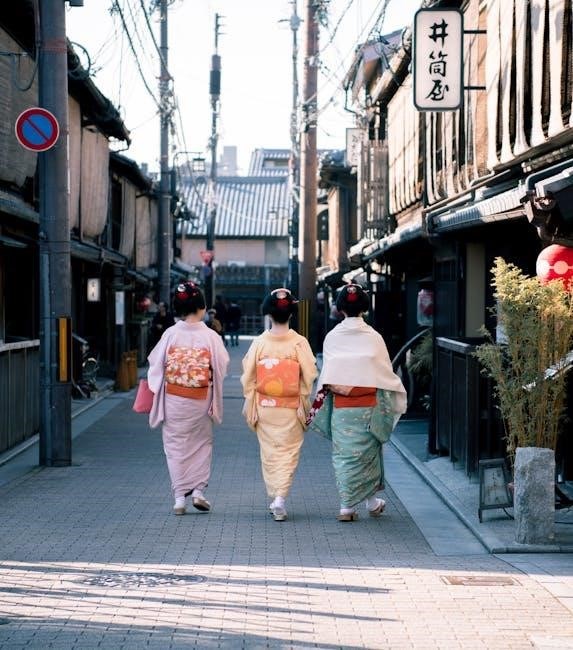
Phrases for Taxis and Buses
When using taxis and buses in Japan‚ knowing key phrases can simplify your journey. Start with “Takushī o yobimasu” (call a taxi) or “Basu noriba wa doko desu ka?” (where is the bus stop?). For directions‚ say “Kono eki made onegaishimasu” (to this station‚ please). PDF guides often include phrases like “Chōsho shite kudasai” (slow down‚ please) or “Kono teishi de orimasu” (stop here). These resources also cover ticketing phrases‚ such as “Basu no kippu wa ikura desu ka?” (how much is the bus ticket?). Having these expressions in a PDF cheat sheet ensures easy access‚ making travel by taxi or bus stress-free and efficient.
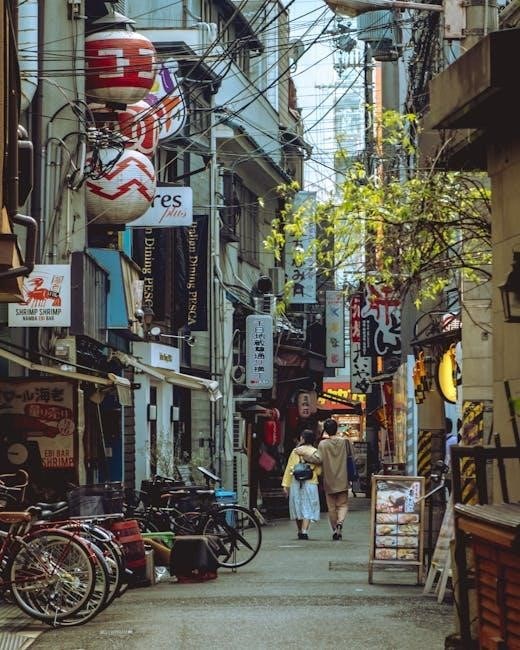
Japanese Phrases for Dining and Food
Essential dining phrases include “I’ll have…” and “Where is…” for restaurants. PDF guides provide phrases like “Sumimasen‚ osusume wa nan desu ka?” (excuse me‚ what’s recommended?) and “Kono ryōri wa oishii desu” (this food is delicious).
Phrases for Restaurants and Ordering Food
When dining in Japan‚ essential phrases include “Sumimasen‚ osusume wa nan desu ka?” (excuse me‚ what’s recommended?) and “Kono ryōri wa oishii desu” (this food is delicious). For ordering‚ use “Watashi wa kono ryōri o kudasai” (I’ll have this dish). PDF guides provide phrases like “Bejitarian desu” (I’m vegetarian) or “Gluten ga haitte imasu ka?” (does it contain gluten?). Additionally‚ phrases like “Okanjo o kudasai” (the bill‚ please) and “Kono ryōri ni wa nan o osusume desu ka?” (what do you recommend with this dish?) are helpful. These phrases‚ found in Japanese travel phrase PDFs‚ ensure a smooth dining experience for tourists.
Phrases for Shopping at Markets
When shopping at markets in Japan‚ essential phrases include asking prices with “Ikura desu ka?” (how much is this?) and requesting to see items with “Chotto misete kudasai” (can I see this?). To ask for sizes or colors‚ use “Kono XX wa doko desu ka?” (where is this size/color?). Bargaining can be done with “Chisai agete mo ii desu ka?” (can you lower the price?). PDF guides also include phrases like “Kono o katte mo ii desu ka?” (is this a good buy?) and “Sōsakuhimē na mono wa arimasu ka?” (do you have anything cheaper?). These expressions help tourists navigate markets effectively and make informed purchases. Many PDF resources provide these phrases in a handy format for easy reference while shopping.
Japanese Phrases for Shopping and Numbers
Learning basic Japanese numbers and shopping phrases is crucial for a hassle-free experience. Essential expressions include “Ikura desu ka?” (how much is this?) and “Chotto misete kudasai” (show me).
Phrases for Counting and Basic Numbers
Mastering basic Japanese numbers is vital for shopping and navigating everyday situations. Start with simple counts: Ichi (一)‚ Ni (二)‚ San (三)‚ Yon (四)‚ Go (五)‚ Roku (六)‚ Nana (七)‚ Hachi (八)‚ Kyū (九)‚ and Jū (十). Learn higher numbers like 100 (Hyaku)‚ 1‚000 (Sen)‚ and 10‚000 (Man). Understanding these will help with prices‚ quantities‚ and directions. Phrases like “Ikura desu ka?” (how much is this?) and “Doko ni arimasu ka?” (where is it?) are indispensable for shoppers. Practice these expressions to enhance your communication skills during your travels in Japan.
Phrases for Purchasing and Bargaining
Mastering essential Japanese phrases for purchasing and bargaining is key to a successful shopping experience. Start with basic expressions like “Ikura desu ka?” (how much is this?) and “Kono XX wa doko desu ka?” (where is XX?). For bargaining‚ use “Chotto takai desu ne” (it’s a bit expensive) or “Wa wa Okuru desu ka?” (can you lower the price?). Phrases like “Kono o kudasai” (give me this) and “Chotto mite mo ii desu ka?” (can I see it?) are also helpful. Understanding these expressions will make shopping in markets and stores more efficient and enjoyable‚ especially in places where English isn’t widely spoken. Keep these phrases handy for a smoother experience in Japan.

Japanese Phrases for Cultural and Social Interactions
Learning cultural and social phrases enhances your interactions in Japan. Use greetings like “Ohayou gozaimasu” (good morning) and polite expressions like “Arigatou gozaimasu” (thank you).
Phrases for Introducing Yourself and Making Friends
Introducing yourself in Japanese is a great way to connect with locals. Start with “Watashi wa [name] desu” (My name is [name])‚ and use “Hajimemashite” (Nice to meet you).
- Use “Kono neko wa kawaii desu ne” (This cat is cute‚ isn’t it?) to initiate conversations.
- Ask “O-genki desu ka?” (How are you?) to show interest in others.
- Say “Eigo wa hanasemasu ka?” (Do you speak English?) if you need assistance.
These phrases will help you break the ice and make friends during your travels in Japan. Download a PDF guide for more expressions to enhance your social interactions.
Phrases for Understanding Cultural Etiquette
Understanding cultural etiquette in Japan is crucial for respectful interactions. Use phrases like “Sumimasen” (Excuse me) or “Arigatou” (Thank you) to show politeness. When visiting temples or homes‚ say “O-jama shimasu” (I’m intruding) upon entering. For apologies‚ use “Gomen nasai” (Sorry) or “Sumimasen deshita” (I’m sorry). Learn to bow correctly‚ as it signifies respect. Download a PDF guide to discover more phrases that reflect Japan’s cultural norms‚ ensuring a harmonious experience during your travels; These expressions will help you navigate social situations with grace and appreciation for Japanese traditions.
